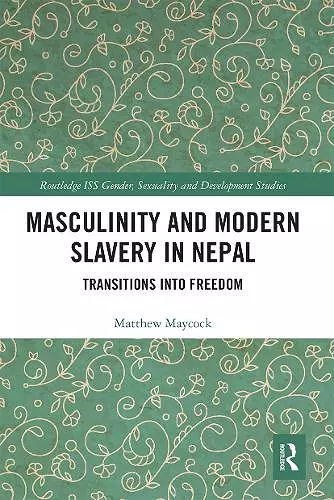Masculinity and Modern Slavery in Nepal
Transitions into Freedom
Format:Paperback
Publisher:Taylor & Francis Ltd
Published:30th Sep '20
Currently unavailable, and unfortunately no date known when it will be back
This paperback is available in another edition too:
- Hardback£155.00(9781138303782)

South Asia is the region with the highest number of slaves globally according to the Global Slavery Index. Bonded labour affects between 15 and 20 million labourers within the region, and is shaped by locally specific interconnections between ethnicity, class, caste and, critically, gender structures. Masculinity and Modern Slavery in Nepal explores the role of masculinity in shaping the structures and experience of slavery and subsequent freedom.
While many I/NGOs and human rights organisations use freedom from slavery as a powerful and emotive goal, the lived reality of freedom for many bonded labourers often results in disappointment and frustration as they navigate diverse expectations of masculinity. Taking Nepal as a case study, the book illustrates how men’s gendered experiences of bondedness and freedom can inform perspectives on the transition to freedom and modernity in South Asia more broadly. Researchers of modern slavery, gender studies, and South Asian studies will be interested in the rich analysis on offer in this book.
"What does it mean to be ‘free’? Maycock’s work on bonded labour in South Asia is an important contribution to the discussions and debates around modern slavery. By paying attention to the emergent expressions, perceptions and experiences of freedom, this book links the ethnographic specificity of the Kamaiya system of Nepal with the larger, global debates on contemporary slavery. Maycock adds to our understanding of subaltern masculinities and the historical and political contexts of masculinity and servitude." -- Radhika Chopra, Associate Professor, Department of Sociology, University of Delhi, India
"This is an extremely valuable addition to the growing body of work that addresses masculine identities in the South Asian context. The book's ethnographic focus on subaltern masculinities is still a largely under-explored topic for the region. Maycock's analysis of the lives and actions of men from the Kamaiya (bonded labour) community of Nepal not only provides important insights into the meaning of 'slavery' and 'freedom', but also allows for a sophisticated understanding of relationships between masculinity and the symbolism of property, consumption, education, marriage, fatherhood and family life. The book will be of great interest to both scholars and practitioners who seek a nuanced engagement with processes of 'development'." -- Sanjay Srivastava, Institute of Economic Growth, Delhi, India
"This book is about the complexity in one of the oldest forms of slavery in the world, the Kamaiya slavery of Nepal. Kamaiya slavery is equally complicated - a cocktail of the caste system, religion, warped masculinity, violence, ethnic discrimination, and a tough physical environment. This book provides exactly the kind of insight we need to get to grips with the slavery of today. It pries us loose from simplistic know-it-all ideas that conceal the tangled and tortuous, but crucial, facts and understanding we need to move from slavery to liberation. Very importantly in this book we hear from slaves and the survivors of slavery, the very voices that are normally neglected yet have the truest sense of slavery. Recommended!" -- Kevin Bales, Professor of Contemporary Slavery at the University of Nottingham, UK
"A stimulating and lucid study of Kamaiya masculinities of far western Nepal, this book transcends the locale of its research to provide fresh insights into gender and caste systems prevailing in South Asia. In addition, it shows how masculine performances are inextricably tied to ever changing, and often contradictory, contexts of modernity. A must read for all those interested in masculinities, gender orders and slavery studies." -- Sanjeev Uprety, former professor, Tribhuvan University, Nepal
"The book fills an important gap in research on masculinity, as well as in Nepalese studies. It offers a rich analysis of the effect of freedom on the Indigenous bonded labourers (Kamaiya) living in the little-known region of far western Nepal. In 2000, the Kamaiya system of bonded labour was formally ended. The author had the opportunity to study the effects of this historical change in the field, between 2009 and 2017, a longue durée which brings all its strength to his observations. The result is a brilliant first-hand account of the Kamaiyas' lived reality of freedom in terms of masculinity, agency and modernity." -- Marie Lecomte-Tilouine, Laboratoire d'Anthropologie Sociale, Collège de France, Paris.
ISBN: 9780367663650
Dimensions: unknown
Weight: 312g
214 pages